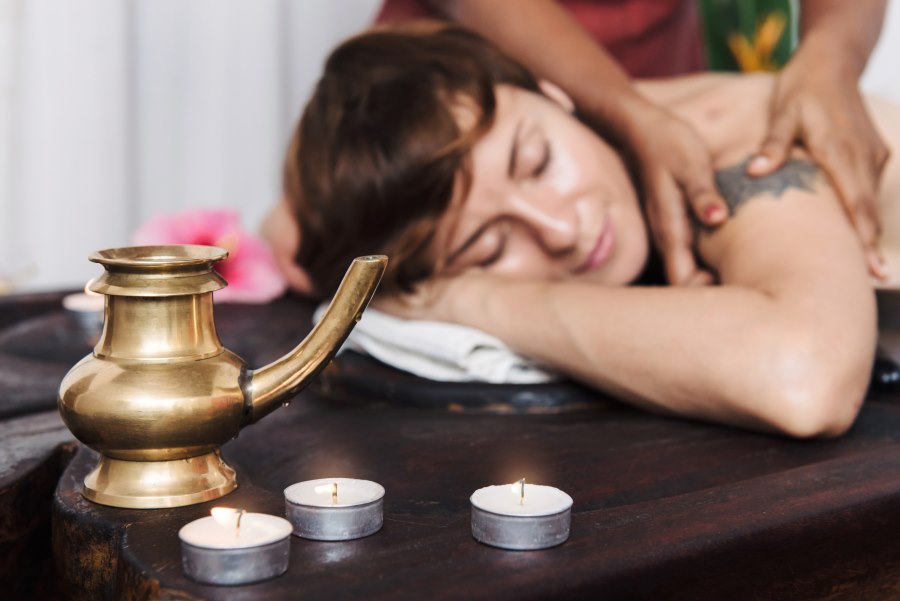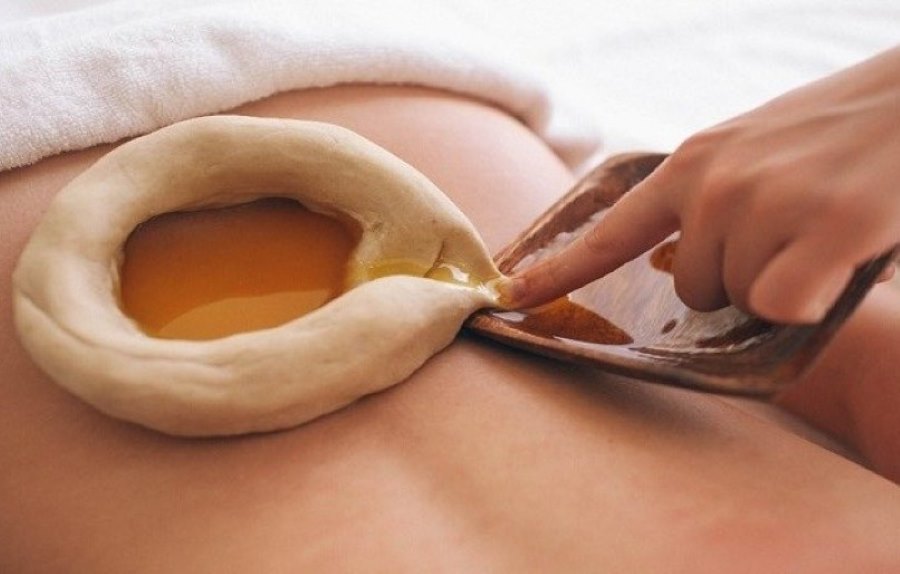What is the Basti Treatment in Panchakarma?

Ayurveda, the ancient Indian system of medicine, believes that an imbalance of doshas causes health hazards and diseases. It stresses using natural procedures and lifestyle changes to balance an individual’s body, mind, and soul. Basti in Ayurveda is one of the most important components of Panchakarma therapy of Ayurveda.
The Basti Procedure is like a cleansing therapy treatment that eliminates toxins from the body and revitalises the nervous system. This article provides every crucial detail related to Basti. Read on.
What is the Meaning of Basti Treatment?
According to Ayurveda, Basti is an essential procedure of Panchakarma therapy. This treatment of Panchakarma removes toxins and unwanted substances from one’s body. When it comes to Basti Karma, Ayurvedic practitioners administer herbal decoctions or medicated oils via the anal route.
This treatment is immensely beneficial as it has a therapeutic effect on an individual. The following sections will explore more details.
Different Types of Basti in Ayurveda

Basti therapy can be categorised as per the nature of therapy and its timings. Given are its important details:
Categorisation of Basti as Per Nature of Treatment
It is possible to categorise Basti according to the nature of its treatment. The categorisation of Basti as per nature of treatment is as follows:
Categorisation of Basti as Per the Number of Required Days
The Basti Treatment varies according to the number of days it takes. The table below shows the categorisation of basti as per the days:
How Does Basti Treatment Help?
An essential area of Vata dosha is the colon in an individual’s body. Intricacies of doshas vary from one individual to another. The Panchakarma treatment first accumulates every dosha of an individual's body in his/her abdomen. This is done through Abhyanga massages and Panchakarma therapy.
After accumulating doshas in the abdomen, they are removed from one’s body with the help of Basti procedure.
What is the Basti Treatment Procedure?
In the Basti procedure, Ayurvedic practitioners administer medicated oils into the body via the anal route. The intestine absorbs the good properties of both the carrier oil and medicines.
Detailed below are the steps of Basti in Ayurveda:
Step 1
The practitioner asks the patient to eat food appropriate for the diseases he is suffering from.
Step 2
The ayurvedic practitioner gives the patient an Abhyanga massage with the requisite oil. Moreover, the patient’s waist is mildly sedated.
Step 3
The patient has to lie comfortably in the left lateral position. He needs to stretch out his left leg and fold his right leg in the front. Furthermore, he must keep his left hand under his head.
Step 4
Ayurvedic practitioner or his helper lubricates the patient’s anal region.
Step 5
The expert inserts a soft rubber catheter into the patient’s anus.
Step 6
The medicated oil is inserted into his rectum with the help of a syringe or enema pot.
Step 7
After the Basti treatment is over, the Ayurvedic practitioner asks his patient to strictly follow the diet prepared for him.
Now that the Basti procedure has been enumerated let's move on to take a look at its benefits.
What are the Benefits of the Basti Treatment?
The following are the various benefits of the Basti treatment:
- Basti therapy effectively treats health disorders arising from abdominal Vata and systemic Vata.
- This treatment effectively addresses health conditions like chronic constipation, sciatica, low back pain, arthritis, gout, etc.
- It helps in the internal nourishment of one’s body.
- The Basti treatment improves immunity.
- It improves the strength of one's body and mind.
- This treatment has anti-ageing benefits.
- Besides rejuvenating one’s body, Basti in Ayurveda improves the quality of semen and eggs.
- It cleanses an individual’s body of the doshas.
- Improving the texture and tone of one's skin is another important benefit.
- It promotes mental clarity and reduces stress, improving cerebral functioning and emotional balance.
- Basti treatment helps regulate healthy sleep patterns and sleeping-related disorders.
- Helps in gaining vitality and energy.
- Improves digestion and metabolic activities, thus continuing to help the normal and healthy body weight.
Why Should One Have the Basti Treatment?
One should undergo Basti treatment to solve health problems caused by an imbalance of Vata dosha. Basti therapy, as prescribed by Ayurveda, leads to balancing and nurturing of Vata dosha. It extracts toxins and impure substances from the cells of an individual’s body and ultimately removes them.
Apart from correcting Vata dosha imbalances, the Basti treatment is of great value to the general detoxification and rejuvenation of the body. Basti therapy, through the use of herbal enemas, cleanses the colon, regulates digestion, and assimilates the nutrients better. It also helps maintain healthy urinary and reproductive systems.
When Should One Opt for Basti Treatment?
The following points state which times are appropriate for receiving the Basti therapy:
- Early morning or evening happens to be the best time for Basti treatment.
- Additionally, if an individual is suffering from any of the following health conditions, it is time for him to consider opting for Basti treatment
Who Should Avoid the Basti Procedure?
The Basti procedure is not suitable for a few people. Given below are the details of people who should not undergo this treatment:
- Pregnant or menstruating women should not opt for Basti.
- When one is suffering from diarrhea or inflammation of the anus, one should refrain from this treatment.
- If someone is bleeding from the rectum, Ayurvedic practitioners will not administer Basti to him/her.
- If one is extremely weak, he or she should rest and not undergo this treatment.
- Patients who suffer from serious heart disease or severe cardiovascular problems may not be able to take the process.
- Patients with ailments due to acute infections or fever should avoid Basti until recovery.
- Patients post-surgery, especially those with recent abdominal surgery, should avoid Basti until full recovery.
- Dehydration, when severe, with a heavy balance of electrolytes, must be kept away from undergoing this therapy.
- Those who suffer from severe liver disorders may have to avoid it due to complications.
What are the Risks Involved in Basti Procedure?
Following are some of the risks associated with this treatment and possible side effects related to Basti, a therapeutic enema used in Ayurveda:
One should consult a qualified Ayurvedic physician before undergoing Basti treatment to ensure the suitability of this therapy in a specific health condition and to minimise risks.
Things to Remember for Basti Treatment in Ayurveda
Enumerated below are certain important points that one must remember before undergoing Basti therapy:
- Materials required for undergoing Basti treatment include a syringe or enema bag, medicated oil or herbal substances, towels, hotplates or a stove.
- One must wait for a minimum of 3 hours after eating for Basti treatment. In other words, one’s stomach needs to be empty while undergoing Basti.
- This treatment should be done in a comfortable, clean and warm room. The best room for Basti would be a room near the washroom.
- Be sure to keep yourself properly hydrated before the procedure. Proper hydration can help in making the treatment effective.
- Refrain from strenuous activities or exercises immediately before and after the treatment to enable the body to fully benefit from the therapy.
- If there is any allergic action from oils or herbs, always inform the practitioner.
- Keep the treatment area and the body clean to avoid possible infection or irritation.
- Pay attention to unusual reactions or sensations during the procedure and immediately report them to your practitioner.
- Undergo any follow-up treatments or consultations recommended to ensure progress is recorded and the effectiveness is successful.
- Check if your health insurance policy provides coverage for AYUSH benefit under policy to avoid any extra expenses.
Basti treatment is essential to bring harmony with your body and balance the Vata Dosha. This article has enumerated crucial details related to Basti in Ayurveda. This is an important Ayurvedic treatment that cleanses an individual’s body of impurities. It successfully addresses various health issues and improves the general well-being of a person.
FAQs about Basti Treatment in Ayurveda
Does Basti help in weight loss?
If one goes through the entire period of Basti treatment diligently and strictly follows the prescribed diet, it will lead to sustained weight loss. Additionally, Basti improves an individual's general well-being.
How long is a typical Basti treatment?
The duration of a Basti treatment depends on a particular patient's health condition. Usually, this can range from 8 to 30 days.
What is Basti therapy?
The Basti therapy includes the process of administering medicated oil or medicinal decoction through the rectal route to bring balance in doshas (body energies) and attain good health.
Which benefits are accorded by Basti therapy?
Basti can help detoxify the entire body system, increase agni or digestion in the body, relieve constipation problems, reduce inflammation, and balance body dosha.
Who should consider undergoing Basti therapy?
The Basti therapy is recommended for those patients having problems with digestion, constipation, or inflammatory conditions or as a part of general detoxification in an Ayurvedic practice.
How is Basti's treatment done?
Basti is given with a syringe or enema bag to introduce the medicated substance to the rectum. The position of the patient may be either supine or lateral.
What medications are administered for Basti?
Basti's ingredients consist of medicated oils, herbal preparations, or both, depending on the patient's constitution and the disease concerned.
How long does a Basti session last?
Generally, a Basti session lasts 15 to 30 minutes. However, depending on special treatments and personal conditions, the period can be shorter or longer.
What should you do before the Basti therapy session?
You should have an empty stomach, having eaten nothing for at least 3 hours. Prepare the treatment area and materials, and consult your practitioner if there are any special pre-treatment instructions.
What are the common side effects of Basti therapy?
Common side effects may include mild abdominal discomfort, cramping, or temporary diarrhoea. If severe symptoms occur, consult your practitioner immediately.
On how many occasions should Basti therapy be given?
The number and frequency of Basti depend on individual health needs and the condition being treated. Your Ayurveda practitioner will advise you accordingly.
For whom is Basti therapy to be avoided?
There are some specific health conditions for which patients diagnosed with them should not try Basti. They involve such cases as severe haemorrhoids, acute gastrointestinal infections, or rectal bleeding.
What should you do after a Basti session?
Take a good rest. Avoid heavy meals and strenuous activities immediately after the treatment. Follow other post-treatment care instructions from your practitioner.
Can Basti treatment be used with other treatments?
Yes, Basti may be part of the treatment under the Ayurvedic approach. It can be combined with other care modes, such as dietary changes, herbal supplements, or Panchakarma procedures.


